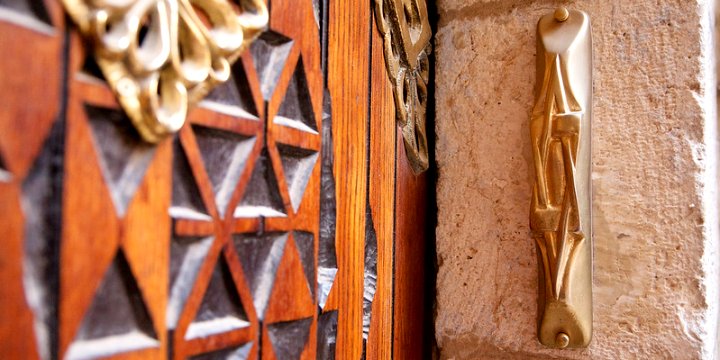We Have a Mezuzah to Tell the World We Are Jews
 by Jeremy Rosen
by Jeremy Rosen
This week, we read about the preparation of the Israelites to leave Egypt. They were told to prepare a lamb for each household to eat together on the night that the Egyptian firstborn would be killed, which would be followed by their escape from Egypt.
In Exodus Chapter 12 verses 6 to 7, the Torah says that this night should be a Mishmeret (which can mean to watch, to keep, to preserve, or to remember). The Jews were also told to take some of the blood of the lamb sacrifice and put it on the two doorposts (Mezuzot), where they would be roasting the lamb over the fire, leaving nothing until morning.
And in Chapter 12 verses 22 to 25, they were told:
You shall take a bunch of hyssop, dip it in the blood which is in the basin, and touch some of the blood to the lintel [above the doorway] and to the two doorposts; and none of you shall go outside the door of his house until morning.
Notice how some of these specific actions would not be repeated in future years, even though the Passover festival became the foundation of Jewish continuity. And it seems that this is the origin of the mezuzah that we fix on our doorposts to this day, although the legal source comes later.
So what is the function of the mezuzah today? On its face, its purpose seems to be to protect the homes of Jews (and back in Egypt, the Israelites) from destruction. And that is why so many people think the mezuzah is some magic charm that protects our homes from evil spirits. I believe, however, that there is a different explanation.
Many Israelites were skeptical about leaving Egypt. A large number of them preferred to stay, either because they had intermarried or because they had assimilated. Perhaps then, the purpose of this ceremony was for Moses to try to get people to commit to the cause. They had to prepare the lamb in advance for three days, which was a kind of public show of defiance to the Egyptians, who did not believe in killing lambs for religious purposes. They had to do something to show publicly they were committed.
This, much more than the issue of protection, is the significance of the mezuzah today — to publicly make a statement and declare that this house is committed to the Torah and Jewish identity.
The first paragraph of the Shemah, which is in every mezuzah, talks about God, the commandments, and passing the message on, which is the key to Jewish continuity. These days, a mezuzah is essential all the more, because we often see that many Jews do not want to expose themselves, particularly in alien environments, where it can be dangerous to be Jewish.
That is why the mezuzah is very important as an act of identification. It is not the mezuzah itself that gives protection. Instead, it is the behavior and commitment that it reminds us that really matters. This is why the Torah keeps on repeating the word Mishmeret, which means to keep, to preserve, and to remember.
The author is a writer and rabbi, currently based in New York.
 US Stops UN From Recognizing a Palestinian State Through Membership
US Stops UN From Recognizing a Palestinian State Through Membership Jordan Reaffirms Commitment to Peace With Israel After Iran Attack, Says Ending Treaty Would Hurt Palestinians
Jordan Reaffirms Commitment to Peace With Israel After Iran Attack, Says Ending Treaty Would Hurt Palestinians ‘Crisis at Columbia’: Elite University Spirals Into Chaos Against Backdrop of School President’s DC Testimony
‘Crisis at Columbia’: Elite University Spirals Into Chaos Against Backdrop of School President’s DC Testimony ‘A Time for Vigilance’: FBI Director Says Agency on Alert for Threats Against Jewish Community During Passover
‘A Time for Vigilance’: FBI Director Says Agency on Alert for Threats Against Jewish Community During Passover New Haggadah Released for Israeli Soldiers in Gaza Ahead of Passover
New Haggadah Released for Israeli Soldiers in Gaza Ahead of Passover ADL Data Reveals Alarming Campus Antisemitism, Despite Strong Jewish Life
ADL Data Reveals Alarming Campus Antisemitism, Despite Strong Jewish Life New Hospital Approved for Construction in Southern Israel Amid Gaza War
New Hospital Approved for Construction in Southern Israel Amid Gaza War UN Security Council to Vote Thursday on Palestinian UN Membership
UN Security Council to Vote Thursday on Palestinian UN Membership New Play Opening in NY Recounts Verbatim Testimonies From Oct. 7 Survivors, Families of Victims
New Play Opening in NY Recounts Verbatim Testimonies From Oct. 7 Survivors, Families of Victims




 US Announces New Sanctions on Iran After Missile, Drone Strike on Israel
US Announces New Sanctions on Iran After Missile, Drone Strike on Israel ‘A Time for Vigilance’: FBI Director Says Agency on Alert for Threats Against Jewish Community During Passover
‘A Time for Vigilance’: FBI Director Says Agency on Alert for Threats Against Jewish Community During Passover Anti-Israel Activists Protest Outside US, Israeli Pavilions at Venice Biennale, Accuse Jewish State of Genocide
Anti-Israel Activists Protest Outside US, Israeli Pavilions at Venice Biennale, Accuse Jewish State of Genocide ‘Crisis at Columbia’: Elite University Spirals Into Chaos Against Backdrop of School President’s DC Testimony
‘Crisis at Columbia’: Elite University Spirals Into Chaos Against Backdrop of School President’s DC Testimony Gaza Terrorist Spokesperson Reveals How Media Falls for Terror Group’s Lies
Gaza Terrorist Spokesperson Reveals How Media Falls for Terror Group’s Lies